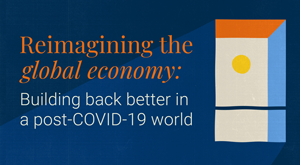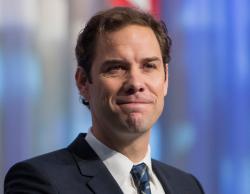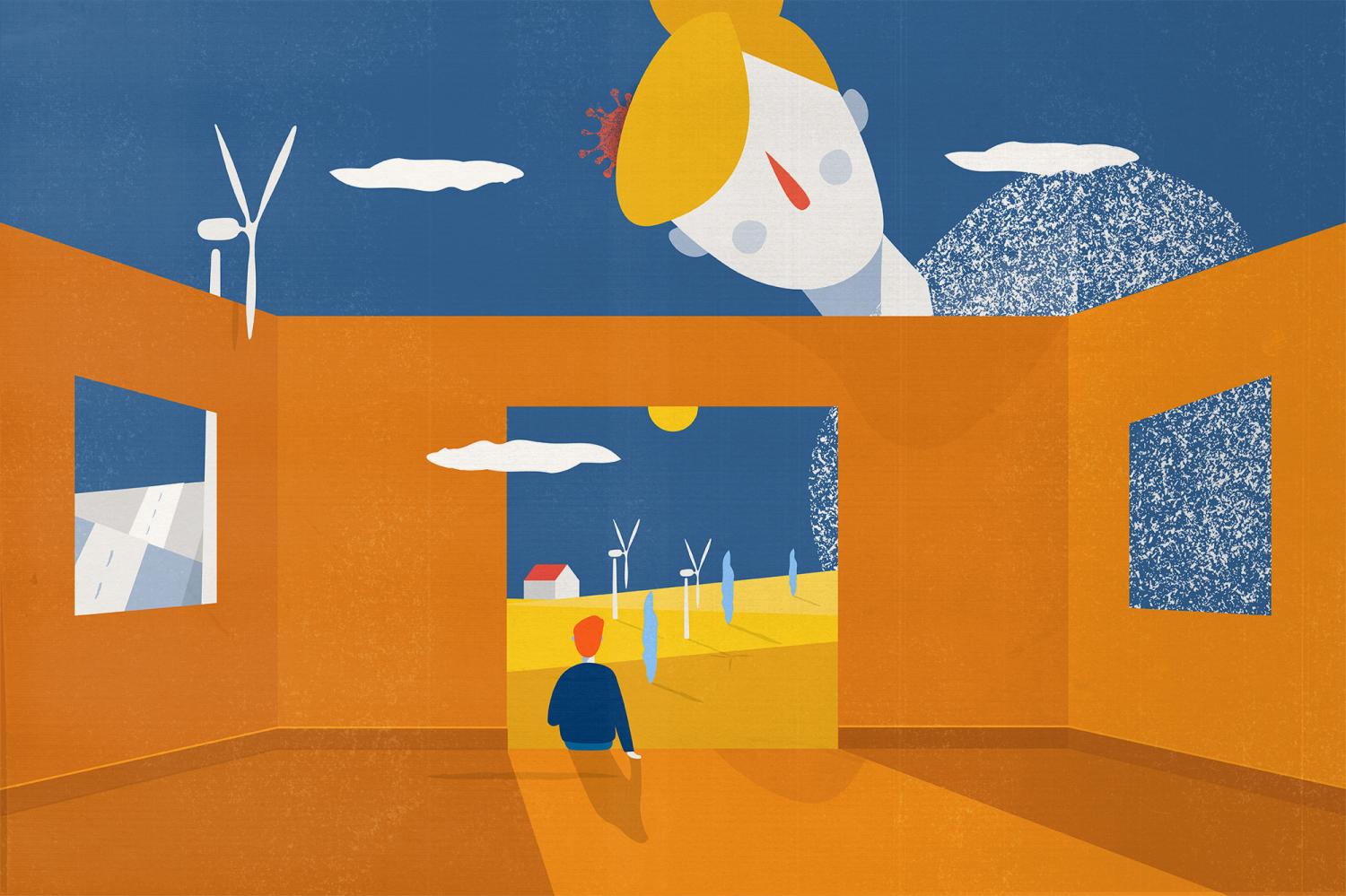This essay is part of “Reimagining the global economy: Building back better in a post-COVID-19 world,” a collection of 12 essays presenting new ideas to guide policies and shape debates in a post-COVID-19 world.
 The issue
The issue
COVID-19 has triggered an onslaught of bad news for global sustainable development. The deepest global recession in memory (-5.4 percent GDP per capita decline)1 and the broadest since the 1870s (more than 90 percent of all countries in recession)2 could imply an estimated 140 million more people will live in extreme poverty3 and potentially 130 million people or more into acute food insecurity.4 Broader societal disruptions have been similarly staggering: as many as 1.2 million additional children dying in six months due to health care disruptions,5 810 million children still out of school as of September,6 and 400 million jobs lost.7 These are just some of the human consequences registered amid collapses in cross-border tourism (-65 percent decline during the first half of 2020),8 trade (around -15 percent during the first half of 2020),9 remittances (roughly -7 percent this year),10 and foreign investment into developing countries (as much as -45 percent).11
Making matters worse, despite the inherent need for global cooperation to defeat a pandemic, COVID-19 seems to have reinforced nationalism rather than internationalism. The potential withdrawal by the United States from international institutions and agreements have made headlines. Less publicized is the fact that while advanced economies will likely spend $11 trillion on their domestic responses to the crisis, the appeal to raise 0.3 percent of that amount, $35 billion, to make COVID-19 vaccines, diagnostics, and treatments available to all countries has struggled to raise a small fraction of the amount required.
Against this troubling backdrop, some analysts have started to wonder whether the Sustainable Development Goals (SDGs), the world’s agreed economic, social, and environmental targets for 2030, remain relevant or not.
The world needs a common scorecard to ensure mottos like “great reset” or “build back better” have objective standards for assessing progress.
The ideas
The case to scale back SDG ambitions garnered increased attention following a July 2020 article in Nature12 and a follow-up editorial.13 The gist is that COVID-19 has made the already-challenging path to SDG success so difficult that a major prioritization and more “attainable” level of ambition is required. The argument suggests that goals and targets should be screened according to three points: (1) is this a priority, post-COVID-19; (2) is it about development not growth; and (3) is its pathway resilient to global disruptions?
Counterarguments have been made, including by us, underscoring the importance of the SDGs as a “North Star” to guide a path out of the crisis.14 Leaders of the Sustainable Development Solutions Network have stressed that goals remain technically and financially achievable, even if current policies are falling short, and that the goals can be used to motivate “truth to power” in pointing out where changes are needed.15
The extent of the crisis doesn’t change the underlying urgency of ending extreme poverty, halting climate change, protecting the oceans, or building inclusive societies. Quite the opposite, the world needs a common scorecard to ensure mottos like “great reset” or “build back better” have objective standards for assessing progress. The SDGs are the guiding framework that all 193 U.N. member states already agreed on in 2015, and that a wide and growing network of business, scientific, and local governments across the globe have already begun to align around. Moreover, investments towards the SDGs can serve as both a means and an end towards a post-COVID recovery. As U.N. Secretary-General António Guterres noted, “Had we been further advanced in meeting the Sustainable Development Goals and the Paris Agreement on Climate Change, we could better face this challenge.”16
As a starting principle, any SDG-oriented strategy needs to recognize the diverse ways in which COVID-19 has affected different constituencies’ outlooks. Table 1.1 summarizes the results of a poll of more than 150 influencers and opinion-leaders taken in the lead-up to the annual September summit of the 17 Rooms initiative convened by Brookings and The Rockefeller Foundation. Participants were organized by 17 different working group “Rooms,” each focused on a topic within one of the corresponding SDGs. So in Table 1.1, the first row provides the average answers given by Room 1 members, who were focused on extreme poverty. The bottom row shows how Room 17, focused on universities as hubs of societal partnership, answered the same questions, and so on.
Looking across the table, one of the first things to note is the common view, under Question 1, that this year’s crises made the SDGs even more important. There is surely sampling bias in the context of the SDG-focused 17 Rooms initiative, but it is still striking the extent to which COVID-19 only seems to have heightened perceptions of relevance of the SDGs. Under Question 2, respondents by and large already felt their respective SDG targets were moderately ambitious prior to COVID-19. There were broad differences, however, under Question 3, on how the crisis had shifted attention. Members of Room 3 on health, Room 10 on inequality, and Room 11 on cities felt the crisis had generated a big increase in attention to their priorities, while several environment-focused groups—Room 12 on responsible consumption and production, Room 13 on climate change, Room 15 on life on land, and especially Room 14 on oceans—were less sanguine, as was Room 1 on extreme poverty.
Importantly, under Question 4, increased attention did not necessarily imply increased optimism for progress next year. Some groups registered pessimistic outlooks, especially on inequality (Room 10), education (Room 4), and hunger and food systems (Room 1). Under Question 5, most Rooms were slightly more optimistic about progress by 2030, but no room was fully confident their SDG objectives were likely to be attained. Members of Room 9, focused on digital infrastructure, had the most positive outlook. Under Question 6, all Rooms seemed to agree that COVID-19 required new approaches in order to generate meaningful progress.
Our key takeaway from this small sample is that the SDGs remain as relevant as ever. But there is no single answer to how all the different SDG priorities should best be approached in 2021 and beyond. Given the practical interconnections among the goals, with success in one often dependent on success in the other, whole-of-society approaches still need to tackle all of the goals together.
In addition to taking the lead to ensure adequacy of resources to fight the pandemic everywhere, the largest and fastest-growing economies can be drivers in better management of the global commons—climate, oceans, and biodiversity— on which all life depends.
The way forward
There is some momentum towards implementing the SDGs as part of the recovery policy landscape. The Canadian and Jamaican prime ministers have been co-chairing a major U.N. effort to link COVID-19 financing challenges to the SDGs. European Commission President Ursula von der Leyen has made sustainability the core of the Recovery Plan for Europe, inspired, in her words, by the SDGs.17 The United Kingdom, chair of the G-7 and host of the COP26 meeting on climate change in Glasgow next year, has committed to a strong focus on sustainability. Public development banks have also agreed to align their $2.3 trillion in annual financing with the SDGs and the Paris Agreement.18
The private sector is showing greater SDG alignment too. In September, the “big 4” accounting firms and the World Economic Forum announced a new set of common and SDG-linked corporate metrics.19 A number of other groups—the Carbon Disclosure Project, the Climate Disclosure Standards Board, the Global Reporting Initiative, the International Integrated Reporting Council, and the Sustainable Accounting Standards Board—also agreed to work together to align their standards and frameworks. Such alignment on metrics will, in theory, permit investors to allocate capital towards companies that contribute more to societal well-being. Coupled with growing evidence that better ESG performance is linked to stronger financial returns in the long-term, a major reallocation of private capital towards more environmentally sustainable and socially inclusive companies could be in the offing.
These examples point to new global drivers of sustainable development. The SDGs are a universal framework, applicable within and across all countries. And because advanced economies have so much more financial firepower being devoted to COVID-19 mitigation and recovery, they also have the opportunity to accelerate global gains. In addition to taking the lead to ensure adequacy of resources to fight the pandemic everywhere, the largest and fastest-growing economies can be drivers in better management of the global commons—climate, oceans, and biodiversity—on which all life depends. Advanced economies also have disproportionate power to change the rules of the global economy in ways that promote equity and sustainability. For example, the OECD/G20 Inclusive Framework is showing signs of progress on fair taxation of multinationals—a proposal that, if accepted, would transfer far more money to developing countries than all foreign aid combined, even if not always to the countries that need the resources most.20 This and other tax fairness measures could substantially raise developing country revenues.
COVID-19 has underscored the great challenge embedded in achieving the SDGs. But it has also demonstrated that the SDGs are not “nice to have” goals; they are “need to have” milestones for the resilient global economy that must be built. Great feats tend to be anchored in corresponding heights of ambition.
As always, history provides lessons for the future. Eighty years ago, amid authoritarian onslaught and one of Britain’s darkest hours, Winston Churchill famously galvanized a nation’s courage—not with a squidgy call to “reconsider what is achievable”—but with a crisp pledge to “never surrender.” Today, in the face of crisis, is not a moment to reconsider the SDGs. This is a moment for absolute clarity in continuing to fight for what the world needs.
-
Footnotes
- IMF, “World Economic Outlook, October 2020: A Long and Difficult Ascent,” October 2020, www.imf.org/en/Publications/WEO/Issues/2020/09/30/world-economic-outlook-october-2020
- World Bank, “Global Economic Prospects, June 2020,” www.worldbank.org/en/publication/global-economic-prospects
- Homi Kharas, “The impact of COVID-19 on global extreme poverty,” Brookings Institution, October 21, 2020, brookings-edu-2023.go-vip.net/blog/future-development/2020/10/21/the-impact-of-covid-19-on-global-extreme-poverty/
- WFP, “New report shows hunger is due to soar as coronavirus obliterates lives and livelihoods,” July 17, 2020, https://www.wfp.org/news/new-report-shows-hunger-due-soar-coronavirus-obliterates-lives-and-livelihoods
- Timothy Roberton et al., “Early estimates of the indirect effects of the COVID-19 pandemic on maternal and child mortality in low-income and middle-income countries: a modelling study.” The Lancet: Global Health 8(7): E901-E908.
- “Education: From disruption to recovery,” UNESCO, September 2020, https://en.unesco.org/covid19/educationresponse
- ILO, “ILO Monitor: COVID-19 and the world of work, Fifth edition: Updated estimates and analysis,” June 2020, https://www.ilo.org/wcmsp5/groups/public/—dgreports/—dcomm/documents/briefingnote/wcms_749399.pdf
- UNWTO, “World Tourism Barometer,” August/September 2020, https://www.e-unwto.org/doi/epdf/10.18111/wtobarometereng.2020.18.1.5
- OECD, “Coronavirus: Living with uncertainty.” OECD Interim Economic Assessment, September 2020, https://www.oecd-ilibrary.org/economics/oecd-economic-outlook/volume-2020/issue-1_34ffc900-en;jsessionid=LZQoZLf3TDd0s2sazaLhc8hV.ip-10-240-5-188
- World Bank, “Phase II: COVID-19 Crisis through a Migration Lens,” Migration and Development Brief 33, October 2020, https://www.knomad.org/sites/default/files/2020-11/Migration%20%26%20Development_Brief%2033.pdf
- UNCTAD, “World Investment Report 2020: International Production Beyond the Pandemic,” June 16, 2020. https://unctad.org/news/global-foreign-direct-investment-projected-plunge-40-2020
- Robin Naidoo and Brendan Fisher, “Reset Sustainable Development Goals for a pandemic world,” Nature, July 6, 2020, https://www.nature.com/articles/d41586-020-01999-x
- “Time to revise the Sustainable Development Goals,” Nature, July 14, 2020, https://www.nature.com/articles/d41586-020-02002-3
- Amar Bhattacharya, Homi Kharas, John W. McArthur, “SDGs: great feats are rarely a product of lowered ambition,” Nature, August 17, 2020, https://www.nature.com/articles/d41586-020-02375-5
- Jeffrey Sachs, Guido Schmidt-Traub & Guillaume Lafortune, “Speaking truth to power about the SDGs,” Nature, August 17, 2020, https://www.nature.com/articles/d41586-020-02373-7
- “Responding to the socio-economic impacts of COVID-19,” United Nations, March 2020, https://unsdg.un.org/sites/default/files/2020-03/SG-Report-Socio-Economic-Impact-of-Covid19.pdf
- “Speech by President von der Leyen at the UN High-Level Event on Financing for Development in the Era of COVID-19 and Beyond,” May 28, 2020, https://ec.europa.eu/commission/presscorner/detail/ en/SPEECH_20_963
- “Joint Declaration of All Public Development Banks in the World,” AFD, November 12, 2020, https://www.afd.fr/en/actualites/joint-declaration-all-public-development-banks-world?origin=/en/actualites
- Michael Cohn, “Big Four firms release ESG reporting metrics with World Economic Forum,”Accounting Today, September 23, 2020, https://www.accountingtoday.com/news/big-four-firmsrelease-esg-reporting-metrics-with-world-economic-forum
- “What is BEPS?” OECD, https://www.oecd.org/tax/beps/about/
The Brookings Institution is committed to quality, independence, and impact.
We are supported by a diverse array of funders. In line with our values and policies, each Brookings publication represents the sole views of its author(s).







